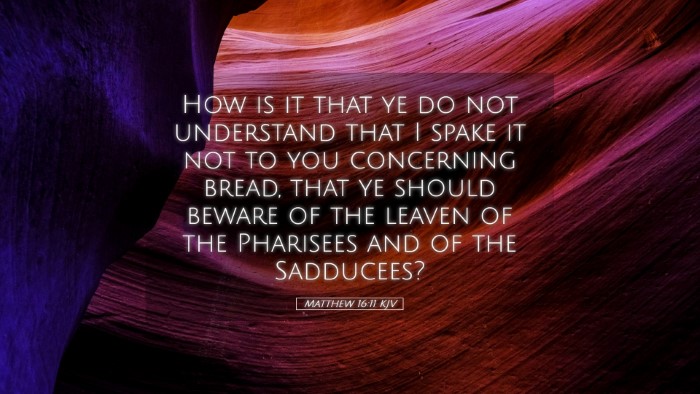Commentary on Matthew 16:11
Bible Verse: "How is it that ye do not understand that I spake it not to you concerning bread, that ye should beware of the leaven of the Pharisees and of the Sadducees?"
Overview
This verse is part of a larger discourse in which Jesus warns His disciples about the teachings of the Pharisees and Sadducees. This caution against 'leaven' is both metaphorical and literal, inviting deeper theological reflection.
Contextual Analysis
Matthew 16 serves as a critical juncture where Jesus is preparing His followers for His impending crucifixion and the establishment of a new covenant. The mention of leaven is significant, particularly within the Jewish context where leaven is often associated with sin and false teachings.
Matthew Henry's Insights
Matthew Henry interprets this passage in the context of spiritual understanding. He emphasizes that the disciples' misunderstanding reflects a broader issue of spiritual dullness:
- Spiritual Insight: Henry notes that just as leaven influences the whole batch of dough, the teachings of the Pharisees and Sadducees can corrupt the faith of believers.
- Literal vs. Symbolic: He balances the literal interpretation of bread with its symbolic meaning. The disciples were concerned with physical sustenance, while Jesus aimed to elevate their understanding to spiritual needs.
Albert Barnes' Commentary
Albert Barnes provides a thorough exegesis of this verse, understanding the metaphor of leaven in several dimensions:
- Leaven as Corruption: Barnes elaborates that leaven symbolizes the corrupt doctrines of the religious leaders. He stresses the need for vigilance against such influences.
- The Disciples’ Failure to Comprehend: He points out that this incident showcases the consistent theme of the disciples' lack of understanding, which is a recurring motif in the Gospels.
- Encouragement to Discernment: Barnes encourages his readers to cultivate spiritual discernment to recognize the subtle errors in teachings that may appear innocuous.
Adam Clarke's Analysis
Adam Clarke offers a detailed historical perspective on the Jewish customs related to leaven:
- Historical Context of Leaven: Clarke explains Jewish practices concerning leaven during the Passover, underlining its symbolic representation of impurity and sin.
- Theological Implications: He connects this verse to the broader narrative of Christ's mission, emphasizing that He came to purify His followers from such corrupt teachings.
- Call for Serious Reflection: Clarke’s commentary is a call to the church for serious introspection and purification, highlighting that the teachings of Christ demand a heart aligned with true doctrine.
Theological Implications
This verse serves as a significant reminder to both the church and individual believers. The metaphor of leaven compels contemporary readers to consider what influences shape their understanding of faith.
- Influence of False Teachings: Just as leaven spreads through dough, false teachings can permeate a community. This calls for robust theological teaching and discernment.
- Understanding Kingdom Principles: Jesus' message transcends physical needs, nudging believers to grasp the deeper spiritual truths of the Kingdom of God.
- Need for Clarity: Getting clarity in one’s spiritual journey involves diligence, studying scripture, and active engagement with sound teaching to guard against misleading doctrines.
Practical Applications
For pastors, students, and theologians, this verse invites several practical considerations:
- Teaching Focus: Emphasize the importance of sound doctrine in teaching curricula, ensuring that congregations are well-informed about the truths of scripture.
- Encouragement of Discernment: Foster environments where questions and discussions about faith can flourish, encouraging a culture of discernment and deep understanding.
- Community Vigilance: Encourage church communities to stay vigilant against teachings that subtly spread falsehoods among believers, leading them away from foundational truths.
Conclusion
Matthew 16:11 serves as a powerful admonition against complacency in spiritual matters. By reflecting on the insights of Henry, Barnes, and Clarke, we gain a robust understanding of how the metaphor of leaven warns against the insidious nature of false teachings while advocating for diligent discernment among believers.


